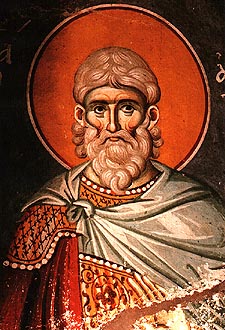New Martyr Auxentius of Constantinople

The holy New Martyr Auxentius was born in 1690 in the diocese of Vellas, part of the Metropolitan district of Ioannina in Greece. When he was a young man, he moved to Constantinople with his parents and became a furrier.
Later, he left his trade and went to work on the ships, leading a sinful life in pursuit of worldly pleasures. His Moslem coworkers turned against him and accused him of denying Christ to embrace Islam. Fearing that they would denounce him to the captain of the ship, Auxentius jumped ship and returned to Constantinople.
Auxentius bought a small boat and earned his living with it. He began to regret his previous conduct, and the desire for martyrdom grew within him. One day, a monk got into his boat in order to cross the water. This was Father Gregory, a monk of Xeropotamou Monastery on Mt. Athos.
He revealed to Father Gregory his desire to be a martyr for Christ. The wise monk praised his desire, but urged caution lest he should weaken under torture and deny Christ. He recommended that Auxentius move to a quiet place and become a monk. Heeding Father Gregory’s advice, Auxentius continued to work with his boat for a time, giving most of his money to the poor, and living as an ascetic.
Auxentius often prayed at the church of the Life-Giving Fountain, asking God to give him strength to become a martyr. Then he returned to his old ship, where his former shipmates began to beat him. They dragged him before the kadi, stating that he had converted to Islam, but then returned to Christianity.
Auxentius said, “I was, and am, an Orthodox Christian. I am prepared to suffer thousands of tortures for the sake of Christ.”
The furious Hagarenes began to beat Auxentius with an iron bar. He lost an eye and several teeth as a result. He remained steadfast in confessing Christ, in spite of all the tortures that were inflicted upon him, and absolutely refused to become a Moslem.
Father Gregory went to see Auxentius in prison, and was asked to bring him Holy Communion on his next visit. The monk did this, also urging him to remain strong in the Orthodox Faith.
The holy martyr was brought before the vizier, who urged him to respect Islam as good and true, instead of treating it with contempt. Saint Auxentius answered that he would never abandon his faith. In fact, he even urged the vizier to become a Christian. This enraged the vizier, and he sentenced Auxentius to death.
After praying for all Orthodox Christians, and for the whole world, Saint Auxentius was beheaded on January 25, 1720 at 9:00 A.M. Two days later, a heavenly light was seen by Christians and Moslems, shining on the body of the martyr.
The sultan’s tailor, an Orthodox Christian named Michael, went to the sultan and asked for the body. Patriarch Jeremiah III accompanied the body to the Church of the Life-Giving Fountain for the funeral and burial.
Two years later, when the saint’s relics were exhumed, a sweet fragrance came forth from them.
